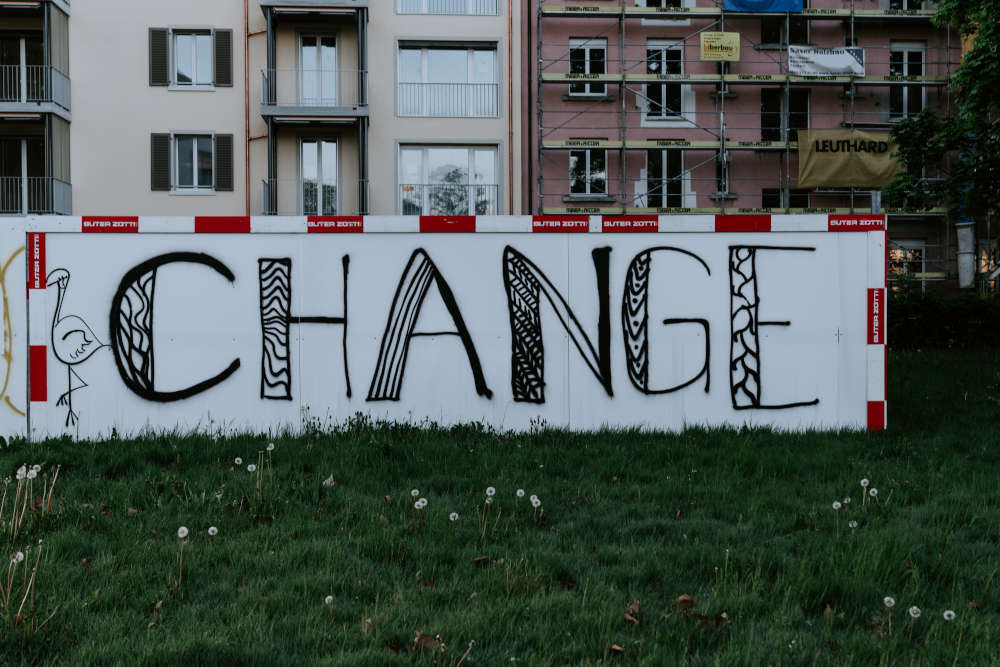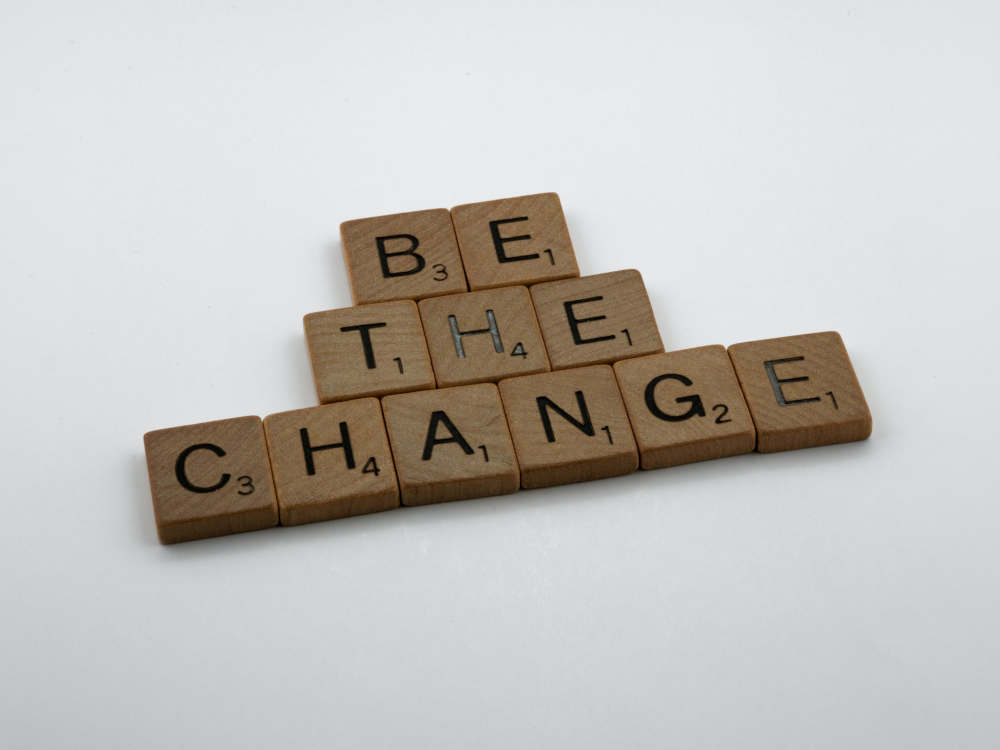You want to change your life but don’t know where to begin?
You feel compelled to make changes in your life. The issue: If we want things to change, we have to start somewhere. And that is sometimes easier said than done.
For a long time, I had a nagging feeling in my stomach that rumbled around, subconsciously signaling that something wasn’t quite right.
When people asked how I was doing, I would say, “fine!” This was because I, like the rest of us, had accepted the current situation as “normal.”
I had no idea at the time that we were programmed to use as little energy as possible. Our brain is set up to avoid changes because they take energy and we want to save energy.
This is also why it is so difficult for us to start exercising or break bad habits.
We can bring about change in our lives by taking small steps and making them a habit. This permanently alters our behavior and, eventually, ourselves.
Dr. Joe Dispenza prefers this method as well. To change your life, you must first change yourself.

Why Change Your Life?
Changes in life are unavoidable. Sometimes they are caused by external circumstances over which we have little control, but much more often we have control.
When things in our lives don’t feel quite right, we usually feel the need for change. Despite knowing that standing still does not make us happy, we rarely act on this need.
Why is this the case? Why do we avoid what would actually benefit us?
This question does not have a simple answer. However, there are common patterns and excuses we use to “avoid” change and not even begin. We’ll walk you through the steps you need to take to get started and start making changes.
Recognize that you have the ability to alter your life!
Dr. Joe Dispenza
The problem: You’re not sure what you want to change in your life.
Perhaps you are familiar with the following diffuse dissatisfaction: You’re not happy with how things are right now, but you can’t put your finger on why.
Perhaps you don’t have “one” big, obvious problem, but rather many small construction sites that need your attention. One thing is certain: you can’t begin to change your life if you don’t know what you want to change about it.
The solution: The best thing to do is analyze your dissatisfaction and categorize it. The “wheel of life,” which has its origins in Buddhism, is an excellent method for this.
It includes the ten most important aspects of life and assists you in taking stock of your life. To accomplish this, draw a circle on a piece of paper and divide it into ten “pie slices.” Fill in the blanks with one of the following categories:
- Finances
- Relationships, love, and sexuality
- Leisure\sProfession
- Family and friends
- Fitness and Health
- Spirituality and Meaning
- Residence\sCreativity
- Participation in social activities
Next, rate each of the ten categories on a scale of 1 to 10 in terms of importance and write that number in the appropriate pie slice.
Then, on a scale of 1 to 100%, rate each category: How satisfied are you with this aspect of your life? Then, examine your completed wheel to determine which areas received the lowest percentages.
Now, for the lowest rated areas of your life, write down what you still lack and what you would have to change to increase the percentage.
Then you figure out concrete steps you can take to improve your happiness in this area of your life. The initial barrier will vanish because you know exactly what you’re missing and what needs to be done!

The problem: the change overwhelms you.
Perhaps you already know what needs to be changed in your life. But the change is so big and seems so hard to make that you quit instead of starting.
For example, you know you should relocate because you are dissatisfied with your current location. Moving is a big step, it’s true: you have to look for an apartment, sign contracts, possibly find a new tenant, pack furniture, organize transportation, and so on.
A large pile of unpleasant tasks has piled up in front of you. And you have no idea where to begin.
The solution: That’s great that you know what you want to change! If you are feeling overwhelmed, it can be beneficial to divide your path to your goal into many small steps and to-dos.
You can also make a timeline from now to your goal and mark many small individual steps chronologically. Then everything suddenly doesn’t seem so big and insurmountable, but you have a concrete roadmap and can get started right away.
The problem: your demands are insufficient.
We frequently avoid making changes because we are too comfortable. We know we should change things, but we settle for an unsatisfactory mediocrity—everything is “just okay.”
It is difficult at times, but we accept it because, as the saying goes, “it will fit.” The issue is that we don’t allow ourselves to think and dream big, and as a result, we miss out on a lot in life.
The solution: Look ahead 10 years and imagine everything remaining the same as it is now: How do you want to reflect on your life thus far? Do you want to be able to say that everything went “okay”?
And perhaps you secretly regret not having dared to take some steps? If not, take the time to become conscious of your deepest dreams and desires, and imagine how this life in transition would feel.
Perhaps there is a place where you can go inside yourself and get away from your daily routine? A place that motivates you to make the most of your life?

You Are Afraid of Change, Which Is a Problem
Fears are cruel because they frequently prevent us from acting. Fear of change can also prevent us from starting.
Because, clearly, changes in life are not always pleasant, and in some cases, they can be extremely painful (for example, divorce) – and it is only after that that things begin to improve gradually, and ultimately improve dramatically.
Such fears stem primarily from previous life situations in which we have had negative experiences with change. Furthermore, we imagine negative scenarios and wonder, “What if everything gets even worse after the change?”
Is it even worth it at that point? As a result, we become paralyzed by fear and fail to begin.
Fears are natural, but they frequently try to slow us down and drag us back into our comfort zone, where we believe nothing bad will happen to us.
You could also relentlessly question your fear of change and consider how appropriate it is. Remember the beautiful moments of change in your life as well.
Perhaps encouraging conversations with friends and family can serve as a minor motivator. Other people can provide us with a completely different perspective on our fears, which we do not always allow ourselves to accept. Maybe you lack the emotional strength and capacity to make changes in your life and adapt to them – that’s fine, too.
In that case, it may be beneficial to simply take stock again a few months later-and then address whatever has bothered and slowed you in the last few weeks.

How Should the Transformation Begin?
- Begin in the morning! Take 10 minutes for yourself as soon as you wake up. Now, instead of doing what you usually do (having a coffee first, reaching for your smartphone, etc.), find a quiet place and slowly drink a large glass of water.
- Close your eyes and recognize that you have the ability to effect change. This does not require influencers or social media! You also don’t have to consume anything to make a difference in your life. Change begins within you!
- Consider how your life would feel after the changes. What are your thoughts on it? Dive into those feelings and try to manifest them.
- We all have bad habits that we don’t like. Whether it’s overeating unhealthy foods, not getting enough exercise, or working too much and not caring enough about our friends. Begin with small steps and gradually alter some of your behaviors. You’ll find it’s easy.
- Every day, you change or vary some of your habits. This will help you become accustomed to the fact that change does not have to be painful or uncomfortable. You’ll have a good time doing it! Make an attempt at something new!
- Your perspective on the world, your past behavior, and your perception of the behavior of others will all change as a result of small changes.
- Consider your changes and write down your findings in bullet points. Recognizing your own behavior and the changes.
Conclusion
In most cases, intentional life changes do not occur all at once. Change happens in small steps, along with reflecting on your past behavior and realizing that you have the power to change.
Recognize that no one will come from the outside to move your life in the direction you desire. Nobody is expecting you to do it for them. You must do it yourself!


